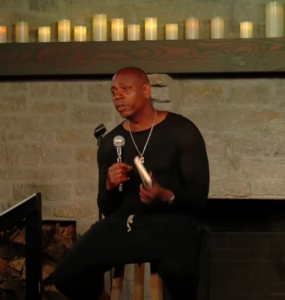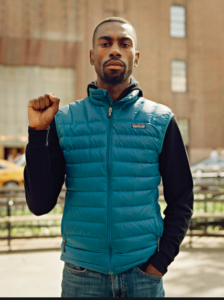
I was recently watching this YouTube clip of Dave Chappelle's powerful monologue called 8:46. (I've linked it here, and maybe you'll want to take the half hour to watch it before reading the rest of this post. That's fine. I'll wait here.) In his performance, it's clear that he's not shy about using profane language. He pretty much hits all of the top ten most vulgar words, but that language isn't what stood out to me.
[I took the photo above as a screenshot from the performance. The photo below is from a Google image search of DeRay Mckesson.]

Not too long before I watched Chappelle's show, I got to hear DeRay Mckesson talk to people from my school. Here's a clip you can watch of DeRay Mckesson. (Again, take the time. It's half an hour in which you will learn a lot about what "defund the police" means and how a systematic reorganization of our resources would improve human experience and limit the systematic violence against BIPOC.) Mckesson's approach differs from Chappelle's in a lot of ways, including his language. When Mckesson analyzes statistics about police brutality, he doesn't use any words anybody would object to.
But did you notice a particular word that both of these men use? I did, and the title of my post probably tipped you off to what that word is -- wild.
So I spent some time thinking about why they use the word "wild" in their descriptions of how out-of-control police violence is, in their analysis of what needs to change in a post-George-Floyd's-murder America. My first thought was that they're both using "wild" to express the same idea that Vizzini gets at when he calls several observable facts "inconceivable." (This clip's worth watching, too. It's less than two minutes long. Actually, if you haven't seen the whole movie, The Princess Bride, then you should go watch that now. Note, this movie offers a different kind of education than the first two videos I've recommended above, but there's no end to what we should learn, right? I'll be right here when you get back.)
In some ways, they do mean "inconceivable" when they use "wild," but I posit that their meaning is more complex, nuanced, and layered. They aren't saying that they can't imagine that these horrible but observable facts are true, as Vizzini seems to be saying. Instead, they are saying that these horrible but observable facts should be beyond what we can imagine. In particular, they're calling attention to the reason these acts should be past what the brain can believe.
Those of us who have lived in a white bubble of privilege our whole lives might not be able to imagine this level of police brutality, violence, and murder, but it exists and is a daily reality for those against whom it is perpetrated. The use of "wild" gets at more than what we can't believe and/or imagine because of our own ignorance. It shows that this behavior is barbaric, uncivilized, uncultured, and primitive: exactly the characteristics that whites have, for more than four hundred years, accused BIPOC of being.
In using the word "wild," this men have flipped the narrative. They're showing that those of us (white people) who think we're advanced, refined humans are actually perpetuating systemic savagery, and that the very idea of "savagery" itself is skewed by a history written by whites, for whites, and about whites. (I acknowledge that the idea of "whiteness" is also a construct. If you don't believe me, please listen to the entire podcast series, Scene on Radio: Seeing White. Start with the linked episode; then, keep listening until you reach the end of the season. After you've listened, let's talk.)
I understand that as an English teacher, I dissect language and care about word choice more than many people do, but there are numerous reasons to care about language. Dave Chappelle and DeRay Mckesson both consider their words carefully to construct their language to have the most powerful impact, and they both decided on "wild" to send its strong message. What do you think about the "wild" events in the world right now? Please share your ideas in the comments.
Thanks for the thoughtful commentary and links. The Dave Chappelle monologue is an extraordinarily powerful expression of justified rage. However, I was very saddened by his unapologetically hostile sexism. I hope we can look forward to a world where formerly oppressed and victimized groups support each other in solidarity to work together for a better future for all of us.
Totally agree!